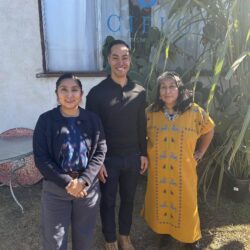
6 Reasons Latino Non-Profits Should Engage in Advocacy
By: Guillermo Mayer, CEO, Public Advocates
When advocacy for social change is part of your organization’s mission you don’t often pull back and ask why engaging in advocacy is so critical. We almost take it as a given. But many small Latino-based non-profits stay clear of advocacy, unaware of the impact they could unleash if they embraced it. Recently, I was asked to talk about why such organizations should be engage in advocacy, including lobbying. Here are 6 reasons why:
1: BECAUSE YOU HAVE THE RIGHT TO. As a non-profit, you can engage in advocacy, including lobbying, within certain limits. Actually, those limits are so reasonable that you have to try very hard to exceed them. So engage in advocacy and do it often! Visit the Alliance for Justice website to learn about the limits.
2: BECAUSE COMPLEX PROBLEMS MUST BE SOLVED UPSTREAM. The underlying causes of problems that small Latino non-profits often address have very deep roots. Take for example the problem of overcrowded classrooms or the shortage of academic counselors at a particular school. These problems are rarely the result of poor decisions by the school principal. More often, they’re the result of bad structural decisions or inaction by policy makers at the district or state levels who fail to provide schools with the resources our schools need. While we must treat the symptoms of problems when they appear, we must also find solutions that address the problems where they originate. Advocacy allows you to do that.
3: BECAUSE YOU’RE NEVER TOO SMALL TO HAVE AN IMPACT. Many small Latino-based non-profits with few staff members struggle to engage in policy advocacy. It just feels like it’s just too much work to take on with limited resources. Those who succeed are strategic about the battles they pick and how they fight – focusing on the issues they know best and joining coalitions or forming partnerships with policy groups they trust. A word of caution here – before you link arms with other groups make sure you are truly an equal partner, with a clear say in setting the policy agenda you’re committing to, and that your voice that is valued and respected. Some groups will use others to advance a pre-determined agenda and they’ll get lots of mileage from that fact that you’re an authentic community-based group. Here’s an easy rule of thumb: if you are being asked to support a policy position, and you were not given the opportunity to give input or shape the position beforehand, a power imbalance exists.
4: BECAUSE THERE IS A RECORD NUMBER OF LATINO ELECTED OFFICIALS AT ALL LEVELS IN CALIFORNIA TODAY AND THEY NEED TO HEAR FROM YOU. Unfortunately, the rise of Latino elected officials has not been matched by a parallel rise in the number of Latino-based advocacy organizations. Elected officials can’t and won’t do it alone. Elections all by themselves don’t solve problems. It’s the day-to-day work that follows that makes it possible to tackle them. Many Latino elected officials want to do the right thing, but they’re playing by the rules of a system they inherited. To take political risks, they need us to have their backs. They need organizations like ours to help them make the case. And if they’re unwilling to take such risks, then we must hold them accountable. In the end, voting is to individuals what advocacy is to groups. Without the latter, we cannot realize promise of the growing Latino vote.
5: BECAUSE IF YOU STICK WITH IT OVER TIME YOU WILL WIN BIG. Public Advocates began as a law firm in the 1970s that relied primarily on litigation to make change. But as the courts began to become more conservative, and it became more difficult to win relief from the courts, we began to turn more and more to policy advocacy. Eventually, we realized we could win as much, and often more that way. Just to give you one example: last year, Public Advocates worked in two advocacy coalitions—the SB 535 Coalition and Sustainable Communities for All—to win more than $120 million dollars in clean air and clean energy investments for disadvantaged communities across the state. That victory grew to $500 million this year. None of us could have won this on our own. We had to join forces and fight for several years for this policy win. The dividends from that advocacy will only continue to grow in future years.
6: LAST BUT NOT LEAST: Because advocacy by small Latino non-profits is what scares the hell out of those who wish to put the brakes on the progress we as Latinos are making in California. Just look at the breakthroughs we’ve achieved in the last decade. We are reshaping California into a state where immigrants and Dreamers are embraced, not demonized; where new school funding formulas hold the promise of prioritizing need over political influence; where climate policy can result in unprecedented investments in disadvantaged neighborhoods, reducing greenhouse gas emissions while combatting poverty and segregation at the same time. We can’t let regressive forces turn back the clock.
So let’s get out there and advocate, and advocate often.








0 Comments